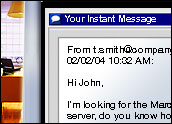
Understanding that retailers prefer to focus on the business of selling their wares rather than becoming experts in the technological guts of an e-commerce site, Demandware recently launched an on-demand, customizable e-commerce solution designed to eliminate the technical headaches often associated with outsourcing e-commerce functions or maintaining a site internally.
Stephan Schambach, who founded Intershop in 1992, began Woburn, Massachusetts-based Demandware last year. Unlike a traditional ASP or outsourcing model, Demandware eCommerce was designed to give retail clients the tools they need to maintain control of their Web site’s content and appearance, while removing the technical requirements — hardware, infrastructure, security and support staff — in-house sites demand.
Demandware’s model gives retailers the flexibility to pay for only the services they use, Schambach, the company’s president and CEO, explains. The company also provides regular software upgrades, guarantees the security of its solution and transactions, and provides access to specialty applications from its technology partners.
Following his arrival in sunny Los Angeles from Boston’s snow-covered airport last week, Schambach discussed Demandware’s approach to e-commerce, some of the challenges retailers face today and why outsourced e-commerce doesn’t work.
ECT: Why did you found Demandware?
Schambach: I built and ran Intershop, and in the year before I left, I increasingly saw a disconnect between what the vendors offer — or what the vendors could offer — and what retailers really need. We found they need sophisticated e-commerce technologies; they need a Web site they are in control of, not some ASP or outsourcer. They need sophisticated e-commerce capabilities, but they don’t want to own and operate the actual IT infrastructure. They don’t want to outsource it to an ASP and lose control over how the site changes or operates. The one approach is too expensive, and the other makes them lose their competitiveness in the marketplace.
We provide a usage-based model that does not require the retailer to own and operate the IT infrastructure. It’s an Internet-based application. We allow the retailers to keep the control and flexibility to personalize or change their site, integrate that site with their vendors and so forth. There are a number of specific advantages we provide in terms of on-demand scalability, because we have a GRID computing approach. We don’t operate like a traditional ASP or a traditional software company. We operate in such a fashion that we use this new model to provide automated software upgrades on a monthly or weekly basis to keep the capabilities they can use for their e-commerce site as fresh as possible. Every time you see a best-practice somewhere, we’ve built it into the platform and it’s instantly available to our customers.
ECT: Without your clients having to do anything?
Schambach: Absolutely. They won’t need servers. They won’t need security experts and security equipment, data centers. ‘ Plus it is better than the traditional outsourcing model where customers lose control. They are given tools that enable them to change and design and pick the features for their site that they really need and want. For example, they can decide, “This season, I want to try a gift registry.” They won’t need to develop it. They won’t need to hire people. It’s available to them as a feature; they just need to turn it on.
ECT: Is this aimed at a particular size retail client?
Schambach: Technically, it is capable of managing the whole spectrum, but our focus is retailers who do between [US]$2 million and $100 million in online business. Not total revenues, just online. There are solutions for retailers that are smaller — like eBay. There are also solutions for retailers who do more than $100 million online, but the vast majority of online businesses that are either standalone or part of multi-channel businesses do between $2 million and $100 million.
ECT: Are you the only one using the usage-based model in this space?
Schambach: Others are more like long-time lease arrangements, where dedicated hardware is being deployed. They have all the ASP problems: It’s not really economical; it doesn’t scale very well, and so forth. Only Demandware can offer a true use-based model, enjoy software upgrades on a weekly or monthly basis and avoid the pitfalls of the ASP model.
ECT: Can you give an example of ROI, in terms of dollars and cents? How much is your service basis?
Schambach: This is a major differentiator. Whereas the more ASP-type offerings won’t publish pricing because it’s the same old story — they find out what the customer potentially has and then they try to get as much out of them as possible — we publish pricing. On our Web page, we have a calculator where you use your traffic levels on site to get a price. That price includes everything from the application, the ability to scale on-demand, the ability to get new functionality as soon as it becomes available. It includes security, it includes firewalls. It includes everything.
It starts at $5,000. A typical Demandware customer is one that pays in the neighborhood of $10,000 a month. They are only charged for what they actually use.
ECT: Demandware recently launched a technology partner program: What type of partners are you working with?
Schambach: First of all, what is special about our technology partner program is we only select on-demand partners. In other words, we don’t partner with companies that have software that needs to be installed somewhere. The advantage our customers have with this partner program is that they don’t need to worry about integration. When we partner with a technology partner, the customer can just turn it on.
We partner with vendors with specialty capabilities that we wouldn’t be able or willing to invest in. For example, one of our partners is Scene7, which provides imaging and can do fantastic things with 3D images and so forth. That’s a very specialized capability. We completely integrated with them.
ECT: And how about on the sales side — do you sell your solution through indirect channels too?
Schambach: It’s a hybrid model. What is really special about our model is that it is open for system integrators and consulting firms. Unlike some of the ASP models out there, where the vendor basically wants to get exclusive access to professional services, we don’t do that. We give our customers the choice of their agency or integrator. We can train the integrator to work with Demandware. There’s a toolkit that’s very easy for them to use.
Two customers, live right now, were integrated by a partner, not by Demandware. While we will generate demand and speak to retailers and prospects, the implementation in most cases can be done by the company a retailer always has a relationship with.
ECT: Are there any specific challenges e-commerce retailers face today?
Schambach: One underlying theme in everything they do is daily optimization. Retailers want to spend their e-commerce budgets on improving conditions, improving the customer experience, not on the IT infrastructure. Giving them access to an environment in which they can rapidly develop a feature or turn on a feature, reducing the time and the effort it takes to do that, lets them integrate quicker.
They are using analytics to understand their customers’ behavior, and then they’re trying to improve the capabilities and user experience on the site in order to raise their conversion rates.
ECT: Another big area that you’ve touched on is security. How do you ensure the security of your clients and their data?
Schambach: We basically guarantee it, and we have the necessary technical infrastructure to prove it. In most cases, we have higher security than the customer’s existing system. Mostly they run it at an ISP. We do have a technical white paper that can be ordered from our Web site that explains our security.
We take this very seriously. We have been successful in bringing on talent that is experienced in the managed services environment. Wayne Whitcomb, who runs operations, has a 10-year ISP managed services background. He ran engineering for a large ISP’s Web site. Demandware is an interesting company, in that it’s the best of the best in managed services and e-commerce.
ECT: Which segues nicely into your background: You founded Intershop, now Demandware: What is it about founding a business that gets you up in the morning?
Schambach: I see and I hear from our customers that we are doing something for them that is really creating value. That’s what gets me up in the morning. I am excited about e-commerce. I know it was out of fashion for a while, but I was convinced that something great would come out of it. It may require learning from some of the past mistakes, it may require new approaches from a technology standpoint, but it can be done. I believe I’m in the greatest industry. We have a very new and fresh approach to solve retailer’s problems — and that’s where I want to be.

























































Social Media
See all Social Media